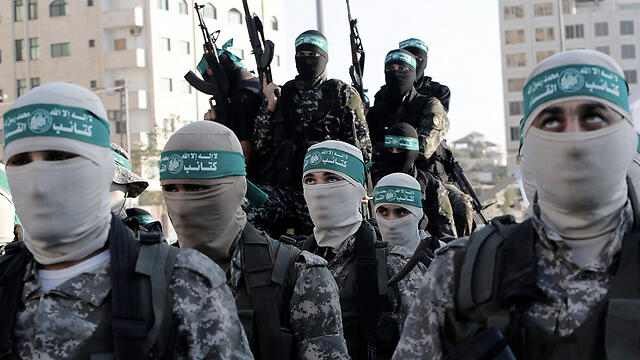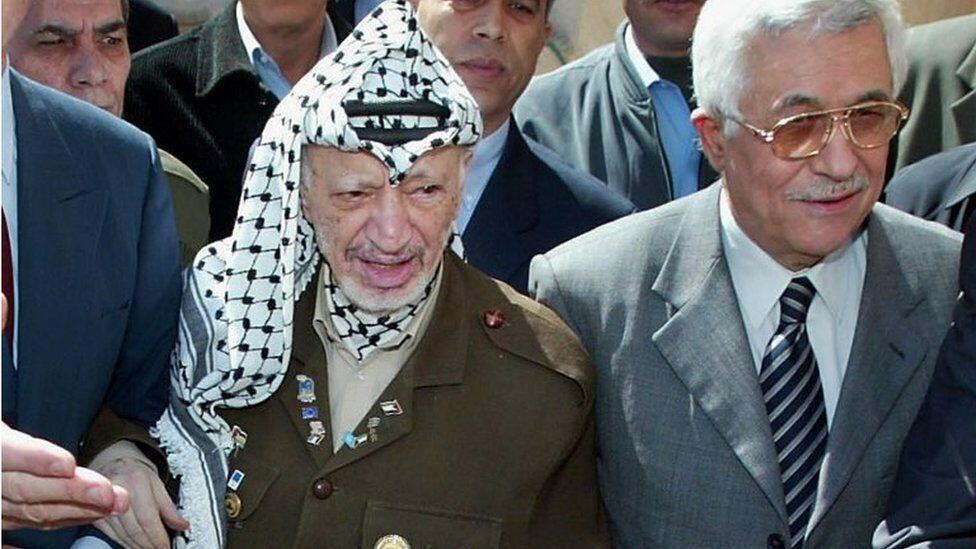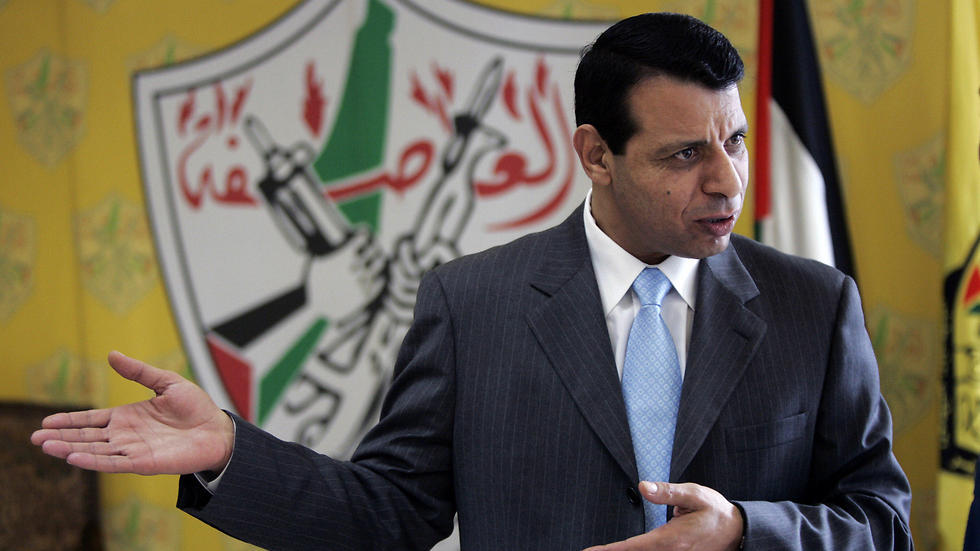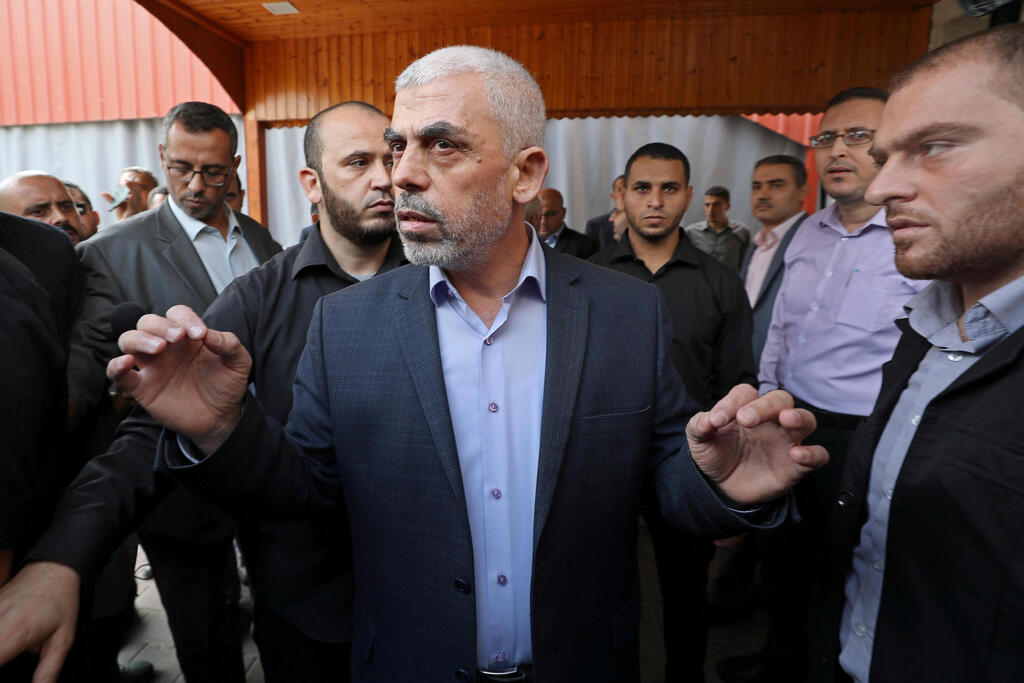Palestinian President Mahmoud Abbas announced general elections last January after years of political paralysis. The call to elections comes as attempts to organize the chaotic Palestinian political landscape is underway.
Fourteen rival Palestinian factions agreed in Cairo last week on steps to advance the elections process. In the wake of the agreement, small steps appear to have been made in bridging the deep divide between the two largest Palestinian factions, Fatah and Hamas.
8 View gallery
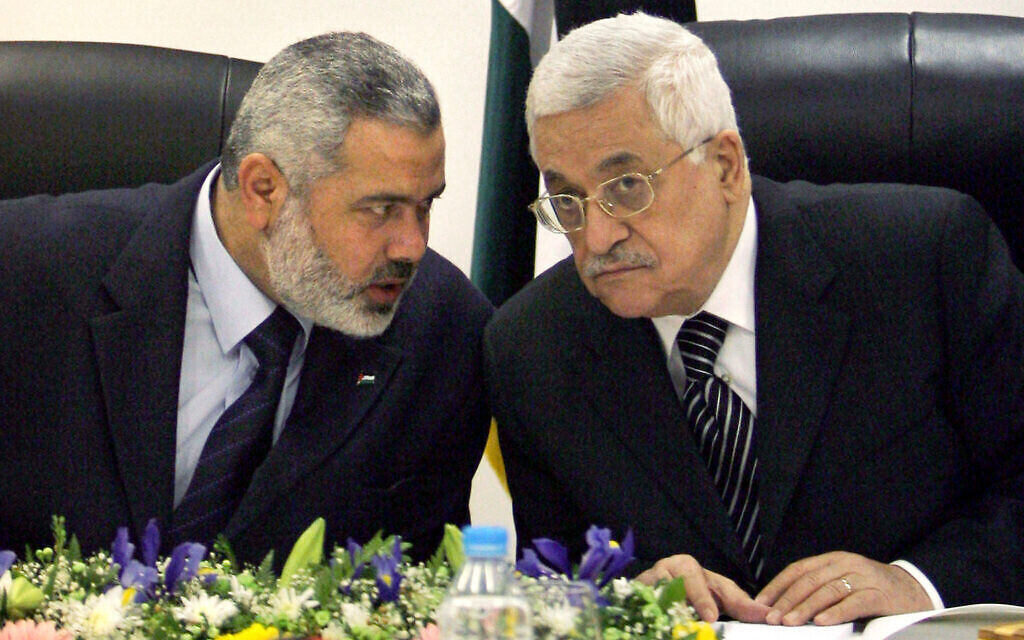

Palestinian President Mahmoud Abbas, right, and Hamas leader Ismail Haniyeh
(Photo: AP)
Osama al-Sharif, a veteran Jordanian journalist and political commentator, says that the internal challenges inside the two largest factions “have forced them into reaching an understanding for now.”
However, some pundits doubt that the elections will actually take place.
“My doubts are not based on the current state of the mindset of the Palestinians, but because I see there are objective political dynamics that will not allow them to happen,” says Ghaith al-Omari, a senior fellow at The Washington Institute.
Omari says that there’s more “energy” and there seems to be more “conviction” among Palestinians that elections will be held than at any other time in the past.
But, he adds, “I just don’t see Hamas and Fatah willing to do any kind of reconciliation.”
According to Omari, reconciliation would require both parties to “really” give up part of their power in the areas under their control. Hamas runs the Gaza Strip, and its rival Fatah rules the West Bank.
He is skeptical that elections will take place since they must be preceded by political and institutional reform.
“Right now, we just simply don’t have an indication that there will be free and fair elections,” or even whether Fatah and Hamas are willing to assure such elections, he says.
Omari calls statements by Abbas threatening to block Fatah members who plan to run on independent candidates lists from participating in the election, including by using force, “troubling.”
In addition, he said, “I very much doubt that Hamas will allow free and fair campaigning in Gaza. They don’t have a good track record of allowing other people to express their political opinions.”
Institutional reform is an essential prerequisite in key sectors within the Palestinian Authority, Omari says.
“If you don’t have strong institutions, a strong and independent judicial system, depoliticized security, it makes it difficult to have a proper election and the results of the elections will not be respected.”
If these reforms don’t take place, he says, the elections will be “irrelevant” and people will “dismiss” them.
Mahmoud Dodeen, an assistant professor of private law at Qatar University, says that calling the elections was a necessity for the Palestinian factions in order to protect their political future.
“Hamas is no longer able to run the Gaza Strip due to the high costs and the decline of its funding sources. Likewise, Fatah’s management of the West Bank is no longer popular because of corruption and favoritism, and its leadership in the national project has declined, thus its popularity gradually erodes,” Dodeen says.
Fatah divided
Aside from the deep divide between the two largest factions, Palestinians must contend with another schism as Fatah, long the most popular faction, faces an intra-party split ahead of the elections.
Abbas, who is expected to run again for president, wants to project at least a semblance of unity as his party deals with its own internal turmoil.
“Fatah has deep divisions between the aging ruling class and the younger members who are fed up with the status quo, corruption and lack of vision to move forward,” says al-Sharif.
He says it is difficult to predict how things will look after the elections, but holding the vote – the first in 15 years – is still the only option.
“Palestinian democracy has suffered as well with Abbas holding all the reins of power without offering anything to the Palestinians and failing to end the rift. The elections will be a leap in the dark and it is difficult to ascertain the final outcome,” he says.
Part of the reason behind the division can be attributed to Abbas’ governing style.
There are glaring differences between Abbas and his predecessor Yasser Arafat, who 16 years after his death is still highly popular and revered among many Palestinians.
Arafat was able to move the street in any direction he wanted, which is something that Abbas hasn’t been able to do. Unlike Arafat, he is unpopular and lacks his predecessor's charisma.
Many accuse Abbas of alienating his base, and some go as far to say that he has “destroyed” Fatah, while centralizing power in his hand and in a small circle of confidants that surround him, such as Palestinian Authority General Intelligence Service head Majed Faraj and Civil Affairs Minister Hussein al-Sheikh.
These two figures in the eyes of many have insulated Abbas from Palestinian public opinion and from what is really happening on the ground, and they are the two confidants that have full, unmitigated access to Abbas, while older veteran Fatah leaders are either shunned or marginalized.
Some of the tactics used, Omari says, include “forcing people into early retirement, using money and government positions to either gain loyalty and patronage or making people pay for their disagreements or opposition of him.”
One example of such tactics was the purging of Abbas nemesis Mohammed Dahlan and his supporters.
Dahlan, the former Gaza security chief, is one of several Fatah members who have set their sights on the presidency.
Dimitri Diliani, spokesperson of the Reformist Democratic faction within Fatah, says Dahlan is a “major threat” to Abbas.
“If Abbas and Dahlan compete head-to-head, the latter will win,'” Diliani says. He added that, a year ago, Dahlan told him he is “not thinking about running.”
The Abbas-Dahlan power struggle is tearing the faction apart. Meanwhile, Dahlan’s supporters say they will run for the Palestinian Legislative Council (PLC), the Palestinian Authority’s unicameral parliament.
“Let’s not jump the gun, but Mr. Dahlan has a great chance of winning the election. Whether Dahlan wants to or not I don’t know now. I asked him a year ago and he said it wasn’t time to talk about it. But I want to state here that it is my wish that he goes for it,” Diliani says.
A Palestinian court convicted Dahlan in 2014 in absentia of corruption charges after a bitter dispute with Abbas.
Abbas expelled Dahlan from Fatah in 2011 and has since dismissed hundreds of his supporters.
He lives in exile in the United Arab Emirates and works as an advisor to the powerful Crown Prince of Abu Dhabi.
Abbas has threatened to block any Fatah member from creating a candidate’s list for the parliamentary election independent of his own.
“It’s laughable. First of all, our ticket will not seek his approval. He can do whatever he wants. We are not subject to his approval; we seek the approval of the Palestinian people, not the approval of an 85-year-old man that hasn’t been elected for the past 15 years,” says Diliani.
“We will enter the election; they cannot stop us.”
Diliani says Abbas has made a “mockery” of Palestinian politics and has weakened the Fatah movement.
“In Palestine we don’t have three branches of government, we have one. This branch of government is held by an 85-year-old guy and the people around him are yes people,” he said.
8 View gallery
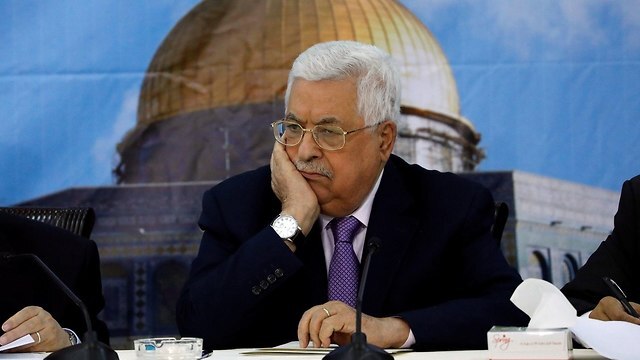

Palestinian President Mahmoud Abbas overseeing a meeting in Ramallah
(Photo: Reuters)
War of succession
But the Abbas-Dahlan feud isn’t the only crisis swirling inside the 53-year-old movement. Abbas has not appointed a successor, creating fierce behind-the-scenes competition between Fatah leaders over who will fill his seat.
Omari, who served as an advisor to the PLO and to Abbas, says division in Fatah also can be seen among the younger generation of the ruling party, which has added to the tensions.
The younger and more energetic members of Fatah, or the Marwan Barghouti branch of the movement, have been pushed aside by the old guard.
“A lot of the traditional Fatah base that would have been mobilized and used to energize the base has simply checked out,” Omari says.
Because of the intra-Fatah divide, some argue that Abbas’ call for elections was a gamble on his part that may lead to the end of his political career.
“He will wait for the results of the legislative elections, to measure the popularity of Fatah, and his popularity personally, and then see if he is able to unify his movement toward him as the only candidate for the movement,” Dodeen says.
Abbas is desperate to conclude the elections so that he can renew his legitimacy in the eyes of the international community and appease the demands of the donor countries, and as he tries to connect with the new U.S. administration, he says.
8 View gallery
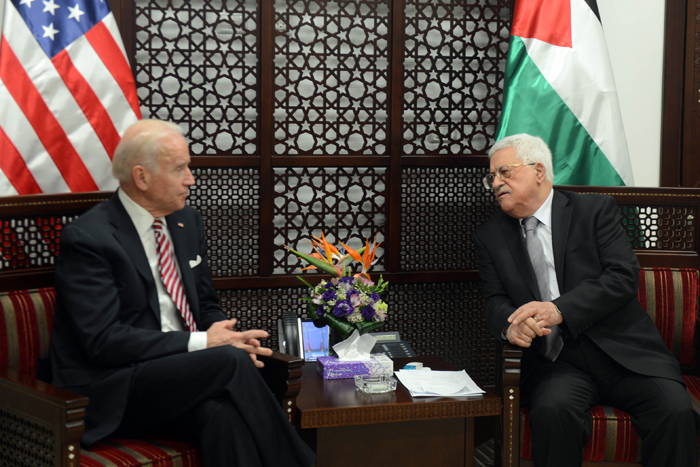

Then-Vice President Joe Biden meeting with Palestinian President Mahmoud Abbas in Ramallah in 2016
Meanwhile, Abbas is facing strong and vocal opposition from within his own Fatah party.
Abbas is now entering the 16th year of what was to have been a four-year term. He also is chairman of the Palestine Liberation Organization (PLO). He has not yet indicated that he will run in the upcoming presidential elections, but many top Fatah leaders say that they will nominate him.
Fatah Revolutionary Council member Hatem Abdel Qader called on Abbas to not run in the upcoming presidential elections, scheduled for this summer.
Dodeen says it is Abbas’ own party that will chart his political future.
“President Abbas’ opponent this time is his party members, not the opposition. They are the ones who will decide whether or not to hold the presidential elections, and this is the problem of Fatah in general, in contrast to the strict and precise organization of Hamas,” he says.
Hassan Awwad, a U.S.-based expert on Palestinian affairs, says that the division inside Fatah is making it difficult to win without a compromise with its main rival.
“Fatah cannot win this election without an agreement with Hamas. Especially in the West Bank. The PA corruption has weakened Fatah in the West Bank. Many Fatah members are running in different independent lists. Fatah will lose these votes. It has to either run in a joint list with Hamas or lose, unless there is a hidden surprise in the Palestinian Central Elections Committee,” Awwad says.
In 2006, the Islamist movement Hamas, shocked the world when it beat its rival Fatah in parliamentary elections. This led to tension between them that ended with Hamas wresting the Gaza Strip away from Abbas’ forces in a short but bloody fight.
And if Fatah doesn’t get its act together, history most certainly will repeat itself.
Ahmed Rafiq Awad, president of the Jerusalem Center for Future Studies at Al-Quds University, says the bitter internal divide will have a major impact on the future of the oldest Palestinian faction.
He says Fatah must “organize its house before the elections and it does not want a repeat of the 2006 election.”
Elections could also precipitate the breakup of Abbas’ Fatah party, in part because he has not groomed a successor and could face a leadership challenge from Marwan Barghouti, the popular Fatah leader who is serving five life sentences in an Israeli prison who says he may run for Palestinian president this summer.
Barghouti enjoys widespread popular support among Fatah loyalists and is positively viewed by other factions.
The announcement could spell doom for Abbas, and his supporters.
According to opinion polls, Barghouti is the only candidate who can beat every Palestinian candidate for the presidency, including Abbas and Hamas head Ismail Haniyeh.
The Palestinian Center for Policy and Survey Research conducted an opinion poll about a month ago, which found that Barghouti emerge victorious in presidential elections.
The poll found that he would receive 61% of votes against Haniyeh, the head of the political bureau of Hamas, who would receive 37%. The poll showed that a united Fatah would get 38% of the vote and Hamas 34% of the vote.
According to the poll, a Barghouti list independent of Fatah’s list, would receive 25% of the vote, while the official Fatah list would get 19%.
Opinion polls show little popular enthusiasm for Dahlan, however. In a poll conducted by the Palestinian Center for Policy and Survey Research, just 7% of Palestinians said they supported Dahlan. Around 22 percent, by contrast, said they support Barghouti.
Barghouti, according to many, has become an existential threat to members of the Fatah establishment, and a threat to their political future.
8 View gallery
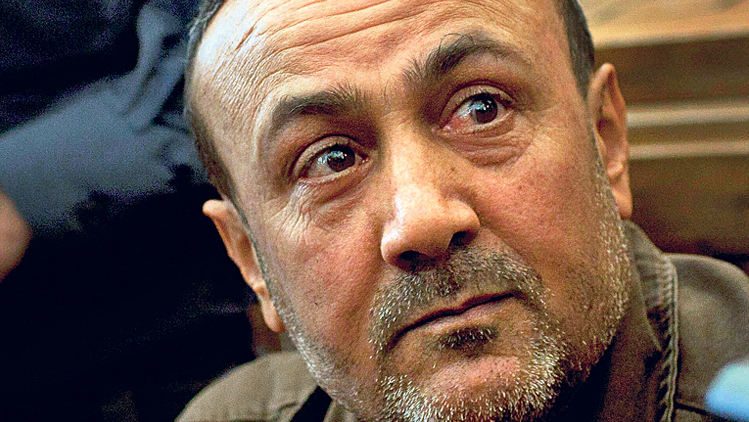

Marwan Barghouti is serving multiple life sentences in Israeli prison for terrorist activity
Sheikh, one of Abbas’ closest confidants, visited Barghouti in prison last week, the Al-Araby Al-Jadeed newspaper reported on Tuesday. Sheikh reportedly tried to convince Barghouti not to enter the Palestinian Legislative Council election on an independent slate, and not to compete against Abbas in the presidential vote.
“The authority wanted to obtain from Marwan a pledge to support the official Fatah movement’s list, and support Abu Mazen as the movement’s candidate, because Fatah learned of Marwan’s overwhelming popularity in the street, and any positive sign from him in this context would enhance the movement’s chances in any upcoming elections,” Dodeen said. He added that the pledge likely would be “in exchange for financial and political inducements.”
According to Palestinian sources, Barghouti is still insisting on nominating himself and forming an independent list, but the next few days may reveal that Abbas and his group of officials have been able to persuade him not to move forward with his plan, by making promises that he “could not refuse.”
According sources in the Fatah movement in Ramallah, intense and heated meetings are taking place to discuss the way forward. Some senior Fatah officials have suggested that Abbas give up running for the presidency, paving the way for Barghouti, and that Abbas continue to serve as PLO chairman.
At least two scenarios have been suggested as a way to accommodate Barghouti’s political ambitions without creating an internal clash within Fatah.
If all factions agree on Abbas as a consensus candidate, it will make it difficult for Barghouti to challenge him.
“Marwan will appear as a disruptor to the national consensus who is seeking his personal interests,” Dodeen says.
The other scenario is to offer Barghouti assurances “of his release during the coming period,” he says.
Ultimately, al-Sharif says: “The Palestinian elections are indeed a priority for the Palestinians more than any other party. After years of stagnation and losses there is a dire need for a new leadership and a more representative body."


